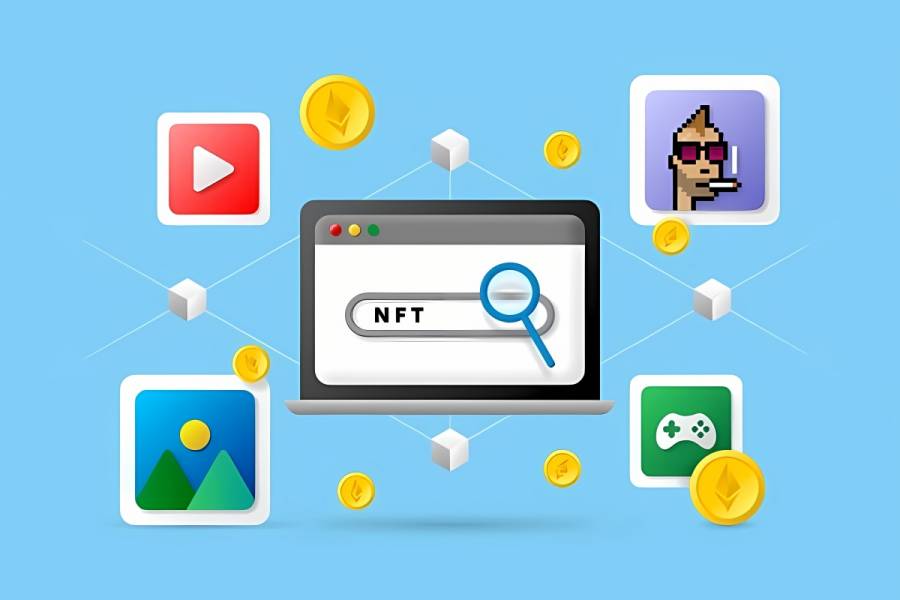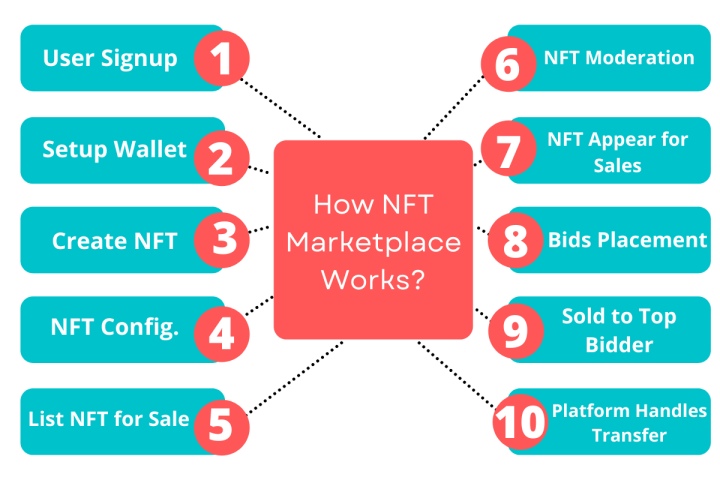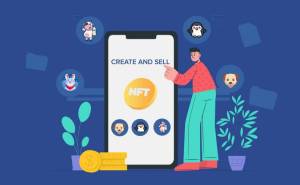Digital collectibles make news worldwide, and people are incredibly excited about owning rare digital assets. As a result, non-fungible tokens soon joined the race of investment plans for individuals.
NFTs worth billions are being traded on digital platforms
These digital platforms are called the NFT marketplaces. The NFT marketplaces function like any other marketplaces facilitating the selling and buying of NFTs. Moreover, these NFT platforms bridge the gap between the buyers and sellers by helping them carry out their transactions smoothly.
NFTs built with blockchain technology will protect the uniqueness and authority of digital assets. The blockchain network prevents digital assets from being stolen, replicated, and manipulated. This is the reason why digital creators are taking up the route of NFTs to generate their revenue. In this blog, we will discuss in brief the NFT marketplace development.
Are NFTs Emerging as the Trendsetter?
Blockchain technology has created a huge revolution where industries have been adapting them to curate their operations. The data and transactions recorded in the blockchain are highly secure, and no hackers will ever dare hack them. Here the data is recorded as blocks in different digital ledgers.
So it becomes difficult for any third parties to hack the data and transactions. Furthermore, when the same technology is utilized in developing the digital assets, they prevent the NFTs from being replicated or hacked.
When the concept of NFTs was coined in the year 2010, hardly a hundred NFTs in total were sold. The scenario has entirely changed where thousands of NFTs are sold in every nook and corner of the world. CryptoKitties and CryptoPunks stand out as a trademark NFT collection that has been sold for millions of dollars.
According to a statistics report, Axie Infinity, the leading NFT gaming platform, witnessed a transaction worth $3.5 billion in 2021. On the other hand, CoinBase, a leading crypto platform, has announced that by the end of this year, it will launch its NFT platform. This information came out after the rise of their user base in October 2021.
Different Use Cases of NFTs

NFTs have created a great hype in the market where people in different parts of the world express their interest in trading NFTs. This interest is the master key to motivating entrepreneurs to explore innovative ideas to venture into the NFT market.
To know precisely about the use cases of NFTs, here are plenty of business uses you should know before commencing your NFT marketplace development and Gaming. NFT gaming is a highly lucrative business model where NFTs are remodeled into the concept of gaming.
After the great success of NFT gaming platforms like Axie Infinity, entrepreneurs are showing more interest in initiating their ventures in the NFT gaming space. By participating in NFT games, the players could win exciting rewards in the form of NFTs.
The gaming characters and collectibles are developed in the form of NFTs, which can later be traded on other NFT platforms.
NFT DeFi
DeFi, which stands for decentralized finance, is something that works based on blockchain technology. NFTs have almost ventured into every form possible. The concept of DeFi NFT is all about encouraging individuals to pledge their NFTs and get money in return for it.
What if someone runs short of money but has NFTs worth millions. This encourages them to pledge their NFTs and get money out of it.
Fashion apparel and wearables
In 2021, popular fashion brand RTFKT sold a digital jacket for a whopping amount of $125,000. Fashion NFTs are the next big thing happening in the NFT market, where popular brands are focusing on launching their fashion NFTs and digital collectibles.
By launching their products in the form of NFTs, they can prevent their products from being manipulated and replicated. Along with the digital NFT tokens, the users will also get their products and items in hand.
Ticketing
NFT tickets are vibing as the next big thing in the NFT space. You might wonder what is so special about NFT tickets? Major sports matches and events tickets are tokenized into NFTs so that NFT buffs do not miss out on paper tickets.
Paper tickets are often missed and misplaced because the event organizers get stuck in between. NFT tickets will also provide the NFT buffs with some real-time utilities.
Prerequisites to Consider for NFT Marketplace Development
NFT platforms are the perfect way to generate revenue for entrepreneurs. From minting to trading, every service related to NFTs will bring revenue to the platform owners. Therefore, when people are interested in buying and selling NFTs, creating a picture-perfect NFT marketplace is important.
Here are the following areas you should consider before developing an NFT platform.
Developing a crypto wallet
Before developing an NFT platform, you should set up an Ethereum wallet compatible with all the blockchain technologies. Most importantly, ERC-721 must be supported in the platform.
However, you can choose between a range of wallets like MetaMask, Coinbase, and Trust wallet that will be compatible with the NFT marketplace development. So select these reliable wallets for your platform.
Secured user accounts
Enable the users to sign in securely with their user credentials. Make sure that they pass through simple and easy procedures to sign in with your NFT marketplace. Creating an account on your platform will further allow them to trade on your platform.
Network fee
When users trade their NFTs in your platform, they will be charged a transaction fee. The transaction fee or the gas fee varies from the type of NFTs and will vary from one platform to another. So decide the transaction fee you would like to fix for your NFT platform.
UX/UI design of the NFT platform development
The design and outlook of the platform is the major feature that will invite huge users to your platform. A friendly user interface is a key to success. So approach your developers with a clear plan for designing your UX and UI.
Decentralization
An NFT marketplace must function decentralized. These platforms do not require any third-party or human interference. The entire activities of the platform should be automated.
Blockchain network
As we all know that blockchain technology is the heart of the NFTs, selecting a reliable blockchain network for your NFT platform is essential. This will help you design a perfect NFT platform for the users.
How To Shape Your NFT Marketplace Functioning?

When you have a clear-cut model for your platform, you should start focusing on its working model. If the platform does not follow a particular pattern of functioning, the users will ignore your platform. Here is how you have to design the working pattern of the NFT platform.
- The users should pass through a simple registration process where they can register themselves with their email addresses, passwords, and contact details.
- The existing crypto wallets of the users are linked with their NFT platform accounts to store and trade the NFTs.
- Digital artists can mint their NFTs by adding their descriptions and fixing a price for the NFT collections.
- The platform will validate the digital collectibles and list them in the platform for selling the NFT collections.
- The sellers should have two options bidding and selling. First, they can fix the price for the NFTs and list them for selling and bidding.
- While developing the NFT platform, you should decide between providing both the English and Dutch auction methods for the individuals.
- At the end of the bidding process, the users and the sellers will be notified about the winners of the bidding process.
- The platform should be developed so that the users are allowed to pay using any of their feasible payment methods.
Exciting Features to Include in An NFT Platform Development
The NFT marketplace should provide fundamental features that are very important for a platform to function. To launch an NFT platform, you should incorporate the following features of your NFT platform;
- A beautiful storefront will let users know and understand more about the NFTs. They can view the history and owners of the NFT collections.
- Digital creators can list their NFT collections for selling or auctioning on the platform.
- The users can search their interested NFT collections on the platform and filter them according to their criteria.
- The intuitive UX/UI of the platform should attract the users when they approach your platform.
- Multiple payment options should be available for the users to pay using any of their feasible payment methods.
Wrapping Up
How interested are you in setting up a strong NFT marketplace development? There are plenty of options lying next to you! But, first, you can adopt a white-label NFT marketplace and start molding your NFT platform!
The post A Detailed Guide on NFT Marketplace Development: Use cases, Prerequisites and Features appeared first on ReadWrite.


Comentarios recientes